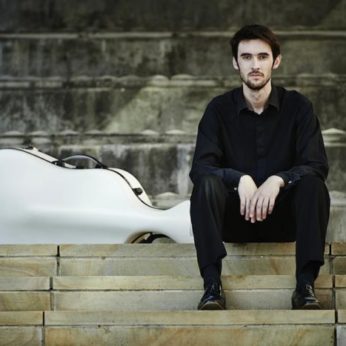Composer: Benjamin Britten (b. 1913 - d. 1976)
Performance date: 05/07/2014
Venue: Bantry Library
Composition Year: 1964
Duration: 00:23:21
Recording Engineer: Damian Chennells, RTÉ lyric fm
Instrumentation: 2vn, 2va, 2vc
Instrumentation Category:Solo
Artists:
Philip Higham -
[cello]

The
first meeting of Britten and Rostropovich has gone down in legend. The occasion
was the London premiere in September 1960 of Shostakovich’s Cello Concerto when
Britten accepted an invitation from the composer to sit in his box at the
Festival Hall. After the concert Shostakovich introduced Britten to Rostropovich,
who begged him to write a piece for him. Britten duly promised to write a cello
sonata if Rostropovich promised to come and play it at Aldeburgh the next year.
Thus began the extraordinary Anglo-Russian collaboration between composer,
cellist and the cellist’s wife, Galina Vishnevskaya, the magnificent Russian
soprano with the great Russian composer an enigmatic, off-stage presence. In
Rostropovich Britten had found a great artist for whom there were no technical
challenges he could not surmount.
Britten
in turn set himself an impossible challenge, namely a promise, duly set down in
the famous table napkin contract, to write six solo suites in homage to Johann
Sebastian Bach. Illness and death eventually restricted Britten to three
Suites. The music is incredibly sparse, pared down almost to emptiness, in a
dramatic contrast to the richness of the Bach. I haven’t yet achieved the simplicity I should like in my music, he
wrote in 1963; this Suite was written a year later. In listening to this work,
it helps to know it was written in the shadow of his War Requiem, something that becomes startlingly clear when you
reach the Marcia with its haunted
bugle calls and drums of war. Indeed this Suite has even been described as a
coda to the War Requiem.
The
opening Canto’s refrain is almost
beyond sadness with its stark and lonely song. It acts as a Greek Chorus,
returning time and again to sing its song. The nine movements flow into each
other without a break. First up is a fugue, a challenge Britten always enjoyed,
leading to the startlingly passionate Lamento
and the first brief return of the Canto.
The technical next challenge is the all-pizzicato guitar-like Sostenuto that leads directly into the
ghostly bugles and drums of the Marcia. After
the final deathly bugle blows, the Canto reappears
for the third time before giving away to the sad folk music drone of the Bordone. The final moto perpetua flies off the strings until the Canto refrain increasingly forces its way back into the music
leading to a dramatic but inconclusive close.
Copyright © 2024 West Cork Music. All rights reserved.
Designed and developed by Matrix Internet